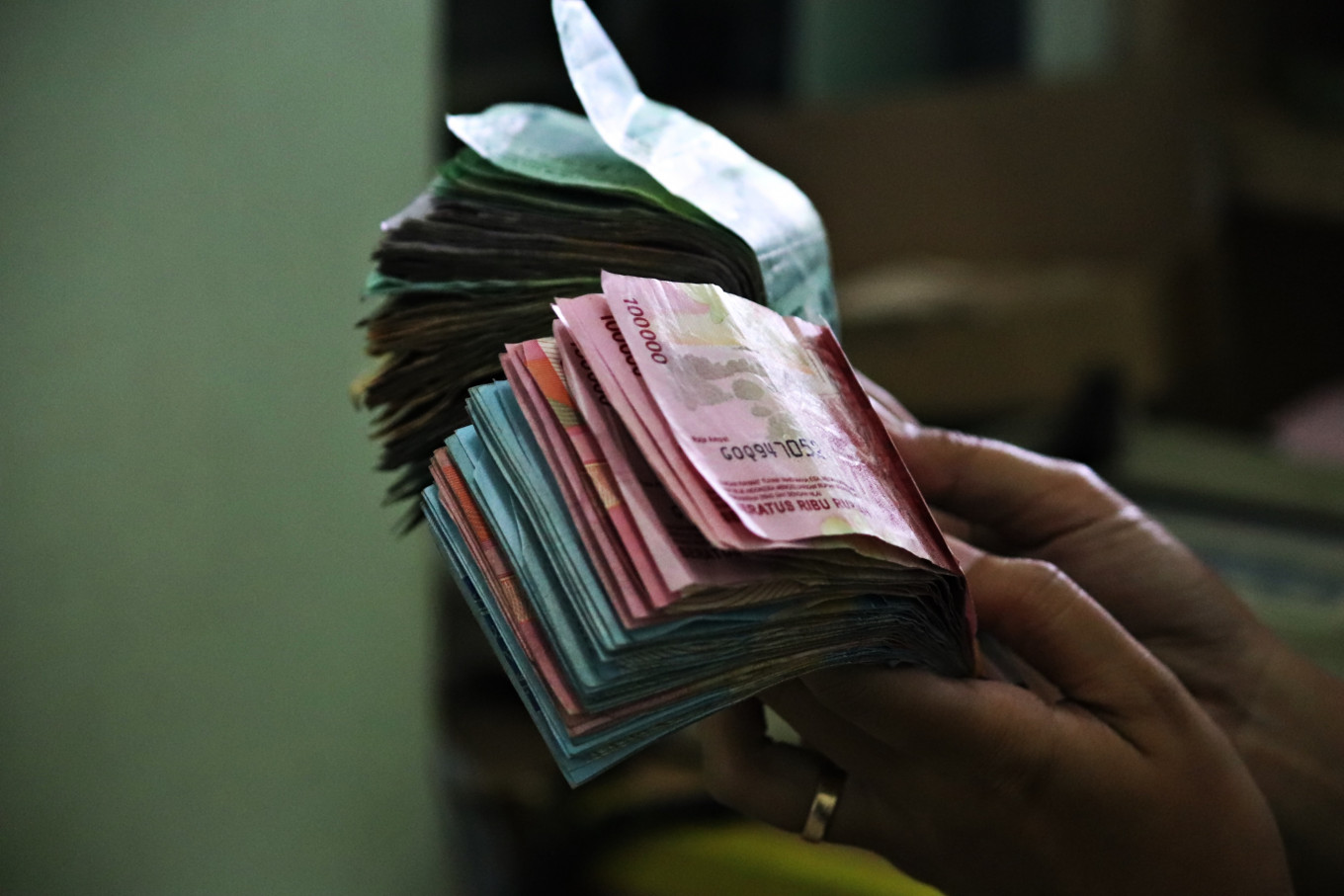Popular Reads
Top Results
Can't find what you're looking for?
View all search resultsPopular Reads
Top Results
Can't find what you're looking for?
View all search results‘Hijrah’ moment: Leaving the dark side of payday loans
To overcome their indebtedness, many individuals apply for another online--payday loan, which traps them in the "Rob Peter to Pay Paul" situation.
Change text size
Gift Premium Articles
to Anyone
I
ndonesia has emerged as promised land for the development of the mobile-payday-loan market (locally known as Pinjol). Based on the data from the Financial Services Authority (OJK), as of April, 122 companies provide legal online-payday-loan services. But the Institute for Development of Economics and Finance (INDEF) data show that 95 percent of payday-loan services are illegal.
Many people today choose to borrow money from the payday loan, because they (1) receive the money instantly, (2) face no restrictions on how to use the loan, (3) have a bad-credit score, (4) require no collateral, and so forth.
From the marketing perspective, many companies from China are entering the Indonesian payday-loan market due to tightening industry regulations set by their government. As the Indonesian market is still in its infancy, foreign companies expect to take a portion of the domestic market prior to any potential regulatory change.
Despite the benefits offered by the mobile-payday-loan-service providers, the industry has its dark side, especially regarding the interest-rate and debt-collection activities. The interest rate of the legal payday loan stood at around 0.8 percent per day in 2021. In a month (30 days), the interest amounts to 24 percent, and in 90 days it soars to a choking 72 percent.
The high-interest rate has led to another problem for lower-income debtors. To overcome their indebtedness, many individuals apply for another online-payday loan, which traps them in the "Rob Peter to Pay Paul" situation.
It is worth noting that Indonesia currently has no specific regulation that protects customers concerning debt-collection activities. In the United States, for example, customers are protected by the Fair Debt Collection Practices Act (FDCPA). The law restricts (1) time and place where debt collectors contact customers at unusual times or places; (2) harassment, which means debt collectors are not permitted to annoy customers by phone calls or other forms of communication.
Due to the absence of legal protection for payday-loan customer in the country, debt collectors feel free to use intimidation, violation of privacy and terror. This method has caused many customers to endure mental distress, depression or even prompted some to commit suicide.
This tragic phenomenon is a result of the low financial literacy among Indonesian consumers. Based on the Organisation for Economic Co-operation and Development’s (OECD) data, Indonesia scores 3.7 in financial literacy, far behind OECD countries which average 4.6.
As a Muslim-majority country, the phenomenon should be seen deeply through the lens of the Islamic-economics concept or Islamic financial literacy. Islamic financial literacy refers to a Muslim's ability to manage financial resources using financial knowledge, attitude, behavior and awareness based on Islamic principles.
Indonesian Muslims need to understand that conventional-financial literacy revolves around interest-oriented investment, which is fundamentally equal to the riba concept or usury, which charges unreasonably high-interest rates. In the long run, the high interest will create disparities in income and wealth distribution, resulting in worsening economic justice instead of social well-being.
In contrast, Islamic financial literacy measures (1) knowledge about the position of riba in Islam, (2) attitude about the prohibition of giving loans to generate income, and attitude about helping others to overcome difficulties, (3) behavior related to the interest-based transaction (4) awareness of the risk-sharing concept, as Islam encourages business partnership and trade (risk sharing) rather than risk shifting from the capital owner to the entrepreneur.
The level of Indonesian Islamic financial literacy, too, is relatively low at the rate of 8.11 percent. This has raised a question about who is responsible to educate the Muslims about Islamic financial literacy.
First is each individual Muslim. Islam is a religion of knowledge. It strongly promotes and recommends knowledge to any individual. The Prophet Muhammad said, "Seeking knowledge is obligatory upon every Muslim.” Thus, we need to learn more about Islamic financial literacy via books and digital sources.
Second is educational institution, especially those specializing in Islamic education. Islamic education should be in harmony with the existing cultural, social, economic and political systems. They should nurture not only the awareness of religious values but also promote the willingness and determination of their students to practice the Islamic economic concept.
Lastly is the economic-financial institution such as Islamic banks and the OJK. They have to and should continuously educate Indonesian Muslim society despite all the hurdles and slow growth of Islamic banks' market share.
It is worth noting that the people in charge of Islamic financial institutions understand that their institutions bear a moral obligation to the community and a duty to glorify Allah (God) by avoiding usury in transactions.
Voluminous academic literature shows that good understanding of financial literacy generally has a positive impact on higher financial resilience, a higher probability of having emergency savings and much higher financial wellness.
Thus, I believe that Muslims with a high level of Islamic financial literacy would instil their knowledge into ethical financial practices that would lead to prudent and wise financial decisions. In other words, they would avoid any activity that would lead only to an increase in financial and emotional burden, such as borrowing from a payday loan, which is fundamentally against Islamic values.
Let us all remember the Prophet’s words: "Be wary of debts; indeed it is sadness at night and a disgrace in the day." Let us leave the dark side of a payday loan to celebrate the light of the Hijrah (transformation) moment.
Happy New Islamic Year!
***
The writer is a senior lecturer at the Management Department, School of Economics and Business, the University of Indonesia.










